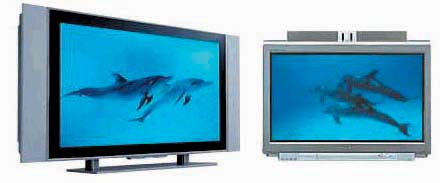Japan's TV Broadcasters Trail in Race to Go Digital
Back to Contents of Issue: January 2003
|
by Sumie Kawakami |
|
 DIGITALIZATION OF TV BROADCASTING is a big national project. According to the government plan, terrestrial digital broadcasting is due to start in three major cities -- Tokyo, Osaka and Nagoya -- in December 2003, and every TV program in Japan will be digitalized by 2011. Japan started satellite digital broadcasting in December 2000, and now a total of 3.22 million households enjoy satellite digital broadcasting programs, according to industry sources. Other plans in the works include offering high-definition programs and establishing TV shopping networks. And because terrestrial digital broadcasting is highly compatible with mobile devices, it's plausible that TV programs will soon be available on keitai handsets and PDAs. Sounds good, doesn't it? But Japan still trails the US, Europe and South Korea in the field of terrestrial digital broadcasts. Korea Broadcasting System (KBS) and three other broadcasters started regular terrestrial digital TV broadcasting in metropolitan areas in November 2001. KBS is now offering two programs. "This year, we are expanding," a KBS engineer told J@pan Inc. "In the case of South Korea, the government is a driving force for the digitalization of broadcasting." Digital experts say the frequency spectrum is far more crowded in Japan than in other countries. Analog terrestrial broadcasting has already used up much of the frequency spectrum available and some of it needs to be "moved" elsewhere before broadcasters start digitalizing. According to the Ministry of Public Management, Home Affairs, Posts, and Telecommunications, the crowded frequency spectrum will cost Japan JPY180 billion to fix, 2.5 times higher than the original estimate. There has been talk about charging broadcasters more for use of the frequency spectrum, but nothing has been decided yet. Japanese broadcasters are spending quite a bit of money in the project. According to the Nihon Keizai Shimbun, Japan's leading economic newspaper, the five major broadcasters together will invest over JPY50 billion on the project over the next few years. Japan has a long way to go to catch up with other broadcasting giants. |
|
Note: The function "email this page" is currently not supported for this page.





